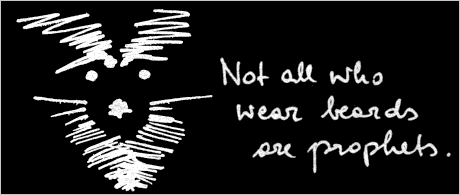Think the unthinkable
February 28th, 2007To achieve the impossible, it is precisely the unthinkable that must be thought.
— Tom Robbins
After you!
To achieve the impossible, it is precisely the unthinkable that must be thought.
— Tom Robbins
After you!
O me, man of slack faith so long!
Standing aloof—denying portions so long;
Only aware to-day of compact, all-diffused truth;
Discovering to-day there is no lie, or form of lie, and can be none, but grows as inevitably upon itself as the truth does upon itself,
Or as any law of the earth, or any natural production of the earth does(This is curious, and may not be realized immediately—But it must be realized;
I feel in myself that I represent falsehoods equally with the rest,
And that the universe does.)Where has fail’d a perfect return, indifferent of lies or the truth?
Is it upon the ground, or in water or fire? or in the spirit of man? or in the meat and blood?
Meditating among liars, and retreating sternly into myself, I see that there are really no liars or lies after all,
And that nothing fails its perfect return—And that what are called lies are perfect returns,
And that each thing exactly represents itself, and what has preceded it,
And that the truth includes all, and is compact, just as much as space is compact,
And that there is no flaw or vacuum in the amount of the truth—but that all is truth without exception;
And henceforth I will go celebrate anything I see or am,
And sing and laugh, and deny nothing.
Walt Whitman, All is Truth. First published in ‘Leaves of Grass’ 1855.
At the end of a lecture series (again, and again on human ecology) students were asked for feedback about the lecture series as part of their exams. In order to get a certificate, students have to hand in a written statement including critical feedback about the lecture series.
If I was in need of self-affirmation, I would just do the same. Critical thinking is all good and praiseworthy. Indeed. Please criticize! Them, me, and don’t forget yourself!
Double binds and Catch-22s might be fun as part of brain-teasers, and they build grounds for game theoretic prisoner’s dilemmas. Though, some might want to keep in mind that double binds have also long been discussed in the context of schizophrenia. As much as they are versatile means of breaking one’s personality and self-esteem they are essential not only to modern techniques of torture.
On no side’s side:
You want feedback? — You got it.
Every sentence that I utter must be understood not as an affirmation, but as a question.
— Niels Bohr (Danish physicist, 1885-1962)

[Bearded Ratta has spoken: Not all who wear beards are prophets.]
At several occasions, Heinz von Foerster presented a numerical sequence which, in a modesty, I shall call “Heinz von Foerster’s sequence”. Given the numbers 0, 1, 2, 3 … up to 9 how would you complete the following ordered sequence:
8 — 5 — 4 — 9 — 1 — …
If you prefer to read about the riddle in detail have a look into Heinz von Foerster’s article “Perception of the future and the future of perception” published in Instructional Science 1 (1972) 2: p31-43.
Here is a variant of “Heinz von Foerster’s sequence”, again for numbers 0 to 9:
8 — 3 — 1 — 5 — 9 — …
At the workshop “Nichtwissen in der Wissensgesellschaft” (Ignorance in Information Society), when the discussions eventually boiled down to one of the workshops focal questions — how to deal with the unknown unknown — Ulrich Müller-Herold gave an illustrative example:
Imagine an aircraft manufacturer has just assembled a newly developed airplane that now is scheduled for its maiden test flight. To minimize all possible risks the airplane has gone through extensive ground testing, and a highly experienced test pilot is chosen.
Still, during the maiden flight unexpected circumstances might arise. So, we may ask what can be done in advance to be able to react as appropriately as possible. For instance, one of perhaps many measures, which the manufacturer may take, is to require the pilot to be completely sober.
What a wonderful example! First, it well illustrates the problem. What can mankind do to stay sober? Second, it even points out a solution. Like we should sharpen our whiskers. Third, and most importantly, it’s flawed.
When I said to Müller-Herold that I found his example very appropriate because it was flawed he told me a story of Heinrich Böll who once calmly replied to a critic that one could reach one’s goal limping, too. (“Herr Böll, der Vergleich hinkt.” — “Ach, man kann auch hinkend sein Ziel erreichen”, here quoted after Joachim Kaiser.)
But, if mankind was not limping probably there would have never been a goal. If an example is to illustrate a flaw it does so well if it is flawed itself. And, indeed, perfectly flawed it is.
